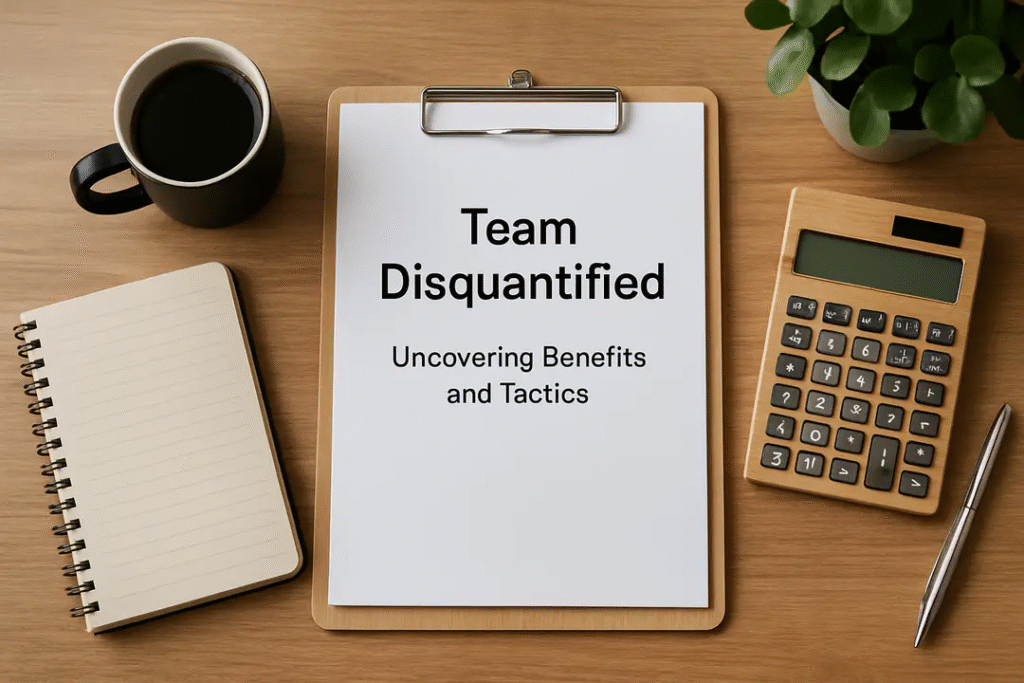When people hear that a team was disquantified, it sounds strange at first. The word catches attention because it feels similar to “disqualified,” but it has its own meaning in sports and competitions. If you have ever wondered what does team disquantified mean and why it happens, this detailed guide will give you the full story with simple explanations, real-life cases, and tips that even young readers can understand.
What Does “Team Disquantified” Mean?
The phrase “team disquantified” is often used in sports and competitive events when a team is removed from a game, tournament, or contest because they broke certain rules or failed to meet requirements. In simple words, it means the team is no longer allowed to continue in the competition.
While “disqualified” is the more common term, “disquantified” is sometimes used in local leagues, casual sports, or even by reporters who want to describe the situation in a different way. The core idea stays the same: the team did not follow the standards set by the organizers, so they lost their chance to compete.
Why Do Teams Get Disquantified?
A team can be disquantified for many reasons, and it usually connects to fairness, rules, and sportsmanship. Competitions exist to test skill, teamwork, and strategy, but they only work if every participant follows the same rules. If a team ignores those rules or gains an unfair advantage, the organizers need to act.
In some cases, disqualification can happen because of serious mistakes, like cheating, or simple errors, like showing up late. Regardless of the reason, the result is the same—the team is taken out of the game.
Common Reasons a Team Can Be Disquantified
There isn’t just one reason why a team might be disqualified or disquantified. Below are some of the most common causes, explained in simple terms.

They Cheated or Broke the Rules
Cheating is one of the biggest reasons for disqualification. If a team uses tricks to win unfairly—like hiding extra players, using banned equipment, or lying about player ages—they can be immediately removed from the competition.
For example, in youth sports, some teams have been caught using players older than the age limit. In professional sports, athletes may use illegal performance enhancers. No matter the level, cheating destroys the fairness of the game, so officials quickly disqualify such teams.
They Didn’t Show Up on Time
Another surprisingly common reason for disqualification is simply not showing up when required. Tournaments usually run on strict schedules, and when a team doesn’t arrive on time, it delays everything. To keep the event fair and moving, organizers often remove that team and let the opponent advance automatically.
This rule may sound harsh, but it ensures that teams respect the time and effort of others. Being punctual is a simple but powerful way to avoid being disquantified.
A Player Did Something Wrong
Sometimes, the entire team gets punished because of the actions of just one player. If a player fights, insults referees, breaks safety rules, or commits dangerous fouls, the whole team can be removed.
This teaches an important lesson: in team sports, everyone’s behavior matters. A single mistake can affect the entire group, which is why good teams focus not only on skills but also on respect and discipline.
Real-Life Examples of Disquantified Teams
The concept of disqualification isn’t just theory—it has happened many times in real competitions. In the Olympics, for example, several teams have lost their medals because of doping scandals. In football (soccer), national teams have been removed from tournaments because of political interference or fielding ineligible players.
Even at school-level tournaments in the United States, some teams have been disqualified for having students who were not from the correct district. These real-world cases show that rules apply everywhere, no matter the size of the event.
Is Disquantified the Same as Disqualified?
This is a question many people ask: is “disquantified” just another way of saying “disqualified”? The answer is yes, in most cases, they are used to describe the same idea—being removed from a competition.
However, “disqualified” is the standard and more official term you will see in international sports, while “disquantified” can appear in casual talk, local reporting, or as a translation from other languages. So if you hear “team disquantified,” just remember it’s another way of saying “team disqualified.”
Can Teams Play Again After Being Disquantified?
This depends on the rules of the competition. Sometimes, being disqualified means the end of the road. Other times, organizers allow a team to return in future games or tournaments. Let’s look at a few scenarios.

After a Timeout or Warning
In some leagues, referees first give a warning or timeout before completely disqualifying a team. If the problem is small—like a uniform issue or minor rule mistake—the team may be allowed to fix it and continue playing.
New Game, New Chance
A team that has been disquantified from one match often still has the chance to play in future tournaments. For example, a basketball team banned from one season because of rule violations might be welcomed back the next year if they show improvement and follow the rules.
What Should Teams Do to Avoid Being Disquantified?
The easiest way for a team to avoid this problem is by respecting rules, showing good sportsmanship, and preparing properly. Teams should:
- Arrive early to games.
- Make sure all players are eligible.
- Respect referees, opponents, and fans.
- Avoid shortcuts or unfair methods.
By focusing on fairness and discipline, a team not only avoids disqualification but also earns respect from everyone watching.
Thoughts on Team Disquantified
Hearing that a team was disquantified might sound disappointing, but it also teaches a valuable lesson about integrity, respect, and teamwork. Sports are not only about winning—they are about learning discipline, handling success and failure, and working together honestly. When a team breaks the rules, they lose more than just the game—they lose trust.
The Bottom Line
In simple words, team disquantified means a team was removed from a game or tournament because they didn’t follow the rules. It can happen for cheating, lateness, or bad behavior, and while it may feel harsh, these rules protect the fairness of the sport.
Whether you call it disquantified or disqualified, the lesson is the same: play fair, respect the rules, and always remember that winning is important, but integrity lasts longer than trophies.
